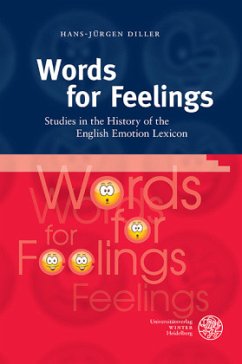The papers and articles united in this volume analyse the use of a selection of lexemes designating emotions in the history of English from Anglo-Saxon times to Late Modern English. An Introduction gives an account of the emotions in modern psychology and of the contribution of Historical Semantics to our understanding of their origins. A number of chapters discriminate the meanings of near-synonyms such as 'wrath'/'anger'/'t ne' or 'joy'/'bliss'/'mirth'. Other chapters trace the emergence and demise of superordinate categories like 'mood', 'passion', and 'emotion'. The analyses are largely based on closed computer-readable collections as they are accessible for Old, Middle, and Modern English. The more recent chapters aim at a balanced consideration of literary and non-literary genres and use a personal selection from more comprehensive repositories like 'Gutenberg', the 'Online Books Page', 'Google Books' and the 'Internet Archive'. To a large extent, that selection draws on traditional bibliographical tools.
Bitte wählen Sie Ihr Anliegen aus.
Rechnungen
Retourenschein anfordern
Bestellstatus
Storno

